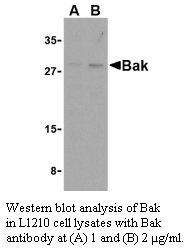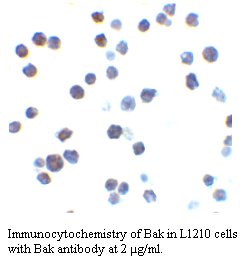Anti-Human Bak (NT)
Data
- -
- -
Antibody DetailsProduct DetailsReactive Species Human Host Species Rabbit Immunogen PN:B468 Product Concentration 0.5 mg/ml Formulation This polyclonal antibody is formulated in phosphate buffered saline (PBS) pH 7.4 containing 0.02% sodium azide as a preservative. Storage and Handling This polyclonal antibody is stable for at least one week when stored at 2-8°C. For long term storage, aliquot in working volumes without diluting and store at –20°C in a manual defrost freezer. Avoid Repeated Freeze Thaw Cycles. Country of Origin USA Shipping Next Day Ambient RRIDAB_2828201 Each investigator should determine their own optimal working dilution for specific applications. See directions on lot specific datasheets, as information may periodically change. DescriptionDescriptionSpecificity Rabbit Anti-Human Bak recognizes an epitope near the N-terminus of human and mouse Bak. This polyclonal antibody was purified using affinity chromatography. Background Apoptosis plays a major role in normal organism development, tissue homeostasis, and removal of damaged cells. Disruption of this process has been implicated in a variety of diseases such as cancer.1 The Bcl-2 family of proteins is comprised of critical regulators of apoptosis that can be divided into two classes: those that inhibit apoptosis and those that promote cell death.2,3 Bak, a pro-apoptotic Bcl-2 family member, is an oligomeric protein that localizes to the mitochondria.4,5 It is thought to share significant functional homology with Bax, another pro-apoptotic Bcl-2 family member, as disruption of bak or bax has little effect on cell death, but mice lacking both genes display multiple developmental defects and cells lacking bak and bax show decreased apoptotic capability.6,7 PubMed References & Citations1. Lockshin, RA. et al. (2000) Cell Death Differ. 7:2-7. 2. Cory, S. et al. (2003) Oncogene 22:8590-607. 3. Heiser, D. et al. (2004) Exp. Geron. 39:1125-35. 4. Kiefer, M. et al. (1995) Nature 374:736-9. Technical ProtocolsCertificate of Analysis |




